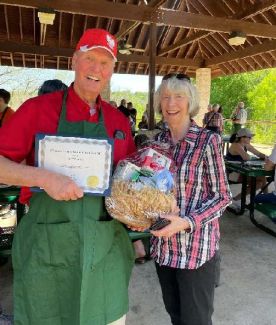Bigos! A Polish culinary delight Bigos (bee-gose) is a Polish national dish, which, according to historians "has been romanticized in poetry, discussed in its most minute details in all sorts of literary contexts, and never made in small quantities." The most famous literary monument to bigos can be found in Pan Tadeusz, a heroic poem venerated as the Polish national epic, extolling the country life of Polish noblemen, written by Adam Mickiewicz in 1834. It describes a group of men out in the woods, enjoying the stew of "wondrous taste, colour and marvellous smell" after a successful bear hunt. The word "bigos" in Old Polish meant fine chopping with a knife. The dish called "bigos" dates back to the 17th century, when bigos was made from everything, meat, fish, crayfish, as well as leftovers from previous dishes. These ingredients, finely chopped with a knife, were seasoned with lemon, lime or wine vinegar, which gave them a sour taste. However, lemons or limes were difficult to obtain and very expensive. Bigos made mainly of meat and exotic spices was affordable only to the affluent Polish nobility. Therefore, in the 18th century, cheaper, native sauerkraut began to be added to the meat or fish. The sauerkraut or cabbage also acted as a filler allowing the cook to reduce the amount of meat. This became common during the reign of King Augustus III (1733–1763). Over the course of the 19th century, its rise in popularity continued as the proportion of meat decreased in favor of sauerkraut. The Austin Polish Society has been hosting a “Bigos Cook-Off” for the past 17 years. The organization was established in 2005 and is dedicated to furthering knowledge of Polish culture, traditions, history, language, and arts, and is a generous supporter of the PHC. A fierce and friendly competition, this social event always draws a large crowd. PHC Board member John Cebrowski (with the help of his talented wife Amanda) won the 2023 competition, in a field of 12 contestants, and gladly shares his ‘Texas version’ of Bigos, Bigos z Teksasu, which contained an ample quantity of Texas beef brisket, harkening back to the ‘heavy-on-the-meat’ version of the 17th century. The recipe John used came from a good friend in Wrocław, Poland, but John modified it a little for the Texas Polonia palate: 2 lbs. of pork tenderloin marinated overnight cut into bite-sized cubes + 1 lb. Kiolbassa brand Polish sausage seared on the grill and cut into thin slices + 2 lbs. of lean brisket, marinated overnight then seared on the grill and cut into bite-sized pieces + 1 large white onion diced into cubes + 2 Tbs. of vegetable oil + 3 cups of beef broth + a package of dried Polish mushrooms (available at Sasha’s European Market in San Antonio, and other Polish food markets.) + a hearty handful of dried plums cut in half + 2 lbs. of sauerkraut, well drained + ½ cup of tomato sauce + 1 Tbs. of flour and 1 Tbs. of butter + and the secret ingredient, Prymat brand “Przyprawa do Bigosu” (seasonings for bigos). Google Prymat, przyprawa do bigosu, and order through Ziggy’s Kielbasa House online for only $2.00, plus delivery! In a large soup pot, sauté the onion in oil. Add pork and brown well on all sides. Add brisket, 2 cups of broth, and bring to a boil. Add broken mushrooms, cover pot, reduce heat and cook for 45 minutes. Add kielbasa slices, spice package, and dried plums. Cover and cook for 15 minutes. Add squeezed sauerkraut and another cup of broth and tomato sauce. Cook 30 minutes. In a dry skillet fry the flour, stirring until it begins to turn brown. Then add butter and stir until butter melts. With the pan still on the burner, add ½ cup of the stew mixture, stirring until well mixed. Then transfer contents of the skillet back to the pot, stir and bring to a boil. Can be served now or kept warm for several hours. Taste improves with time! An option to consider: Add a little red wine and honey at the end. We urge you to consider this Polish culinary tradition for family, church, or community events…and…why not have a local competition of your own! Let your own culinary creativity run free! Smacznego! (Good appetite!) Adam Zalewski and Joanna Sokołowska contributed to this article.
